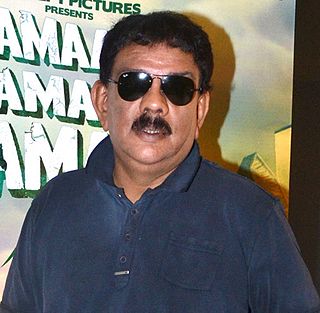A Quote by Rajkumar Hirani
When you make a film you make a film. You don't think about how it will be marketed.
Related Quotes
You make a film and you can't really pick the way it's put to the public. You control the content, but the way it's marketed, or the poster, or what they're telling the public about the film, it's beyond you. Some people don't even see them, because they think they already know it. That can be frustrating, when something you've done is marketed in a way you think is antithetical to what it is.
I'm ready for all forms of dialogue about the film The Conquest. There will be a lot of political talk, but I don't think the film itself will be scandalous. For the French, there are so many emotions relating to Sarkozy and politicians in general that I think the film will generate a lot of passion, whether it be negative or positive. Above all, it's a fictional film. It was important not to make a documentary and to really pay attention to the images. From the choice of the actors to the mise en scene, the film is completely cinematographic. It's not just a boring political movie.
I think a lot of people go into filmmaking thinking, "How can I make a career?" And so when they make their first film, they make it thinking, "Well, this'll be the one that gets me to the place where I can make the second film the way I want to make it, and that'll get me to the place where I can make $100 million on the third film." And I thought, "Well, if I put sustainability at the bottom of my priority list, then what opportunities is that going to free me up to pursue?" And that's what I've always done.
For me, as a film goer, I like nothing more than to sit in the cinema, have the lights go down and not know what I'm about to see or unfold on-screen. Every time we go to make a film, we do everything we can to try to systematise things so we're able to make the film in private, so that when it's finished it's up to the audience to make of it what they will.
To spend any time with someone who is among the top five film composers of the last 50 years is pure gold dust. I mean, not necessarily stylistically, because everyone is different in what their music sounds like, but the approach and how to look at a film, how to think about a film, how to decide what you want to do, how to think about characters, how to think about art, how to think about narrative, how to liaise with producers, how to liaise with directors.
I really discovered [Dr.Strange] through hearing about this film and first meeting Scott [Derrickson] and getting into it and just opening up and saying, "Okay, this is, like all comics, very much of its era," and my first question was, 'How do you make this film? Why do you make this film now?' and the answers were so enticing that I was like, "I'm in."
I can understand that an audience, buying a ticket to see a picture of mine, wants to see something funny because they feel confident that at least I have a fighting chance to make a funny film when I make a film, whereas if I make a dramatic film there's one chance in a thousand that it's really going to come out great, so I understand how they feel about that and they're completely right.
I'd never read 'Prince Caspian'. I watched it and loved that film. Everybody was talking about its lack of success; its relative success in comparison to the other film. It's a great film. It deserved to do a lot better than it did. It's very difficult to make a film that will match up to the first.





































